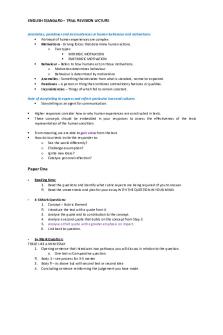English school - Lecture notes Theories of IR PDF

| Title | English school - Lecture notes Theories of IR |
|---|---|
| Course | Introduction to international relations |
| Institution | University of London |
| Pages | 2 |
| File Size | 71.9 KB |
| File Type | |
| Total Downloads | 55 |
| Total Views | 131 |
Summary
notes provided by course team on the VLE...
Description
English School in IR What is the English School of International Relations? Ø A school of thought in IR focusing on the norms, rules and practices, that have evolved over time, which shape relations between international actors. This counters a purely materialistic view of inter-state relations Ø Norms, rules and practices serve as an informal set of guidelines for acceptable behaviour between state and non-state actors, and actors who abide by these guidelines are part of an international society, whose norms, rules and practices facilitate coordination and cooperation between members. Ø Views the international arena as a “society of states” Ø There are (theoretically) three spheres at play at the level of international politics: o International system (Hobbes/Machiavelli) o International society (Grotius) o World society (Kant) Of the three, the English School focuses on the existence of an international society, a set of actors (states) with shared norms, rules and practices (institutions) that shape actors’ behaviour. The idea of an international society offered a middle ground between realist and liberalist views. What are the origins of the English School of International Relations? Ø Developed 1959 onwards, not actually ‘English’ per se Ø Originally the English School tried to incorporate realism and liberalism to explain cooperation in the international system Ø Influenced by the fields of world history, international law, political theory, and normativism What does the English school emphasize? Ø The concept of an international society of sovereign states Ø International society does not require a supreme arbiter or leviathan to function, rather, order emerges from the repeated interactions and dynamics of international actors. Ø Certain realist ideas, such as power and the primacy of states interacting in an anarchic system (an anarchical society) Ø Certain liberalist ideas, such as recognition, equality, interests, rights, agreements, disputes, and other normative categories Ø The process of historical change, and tracing the evolution of international institutions (both formal and informal) Ø Institutions are always changing, and provide a basis for order within the anarchic society around us. Ø The English School’s focus is not on any one institution or international organization, but on institutions in the international sense i.e. diplomacy Ø A focus on individuals, norms, values, practices, and discourse Key thinkers Ø Hugo Grotius Ø Hedley Bull (Read “Anarchy” in GCR) o The Anarchical Society (1977) Ø Martin Wight Ø Barry Buzan
Key questions - How does international anarchy produce international order? - How are institutions defined by English School proponents?...
Similar Free PDFs

IR-chapter 2 - IR lecture notes
- 18 Pages

English School
- 5 Pages

Theories IN School Counseling
- 12 Pages

Notes of IR - For CSS
- 55 Pages

Theories of Personality - Notes
- 16 Pages

Historical school - Lecture notes 3
- 12 Pages

English 111 Lecture Notes
- 13 Pages

English Standard Lecture Notes
- 3 Pages

English - Lecture notes AA
- 4 Pages

Comm theories - Lecture notes All
- 61 Pages

English school - book chapter
- 14 Pages
Popular Institutions
- Tinajero National High School - Annex
- Politeknik Caltex Riau
- Yokohama City University
- SGT University
- University of Al-Qadisiyah
- Divine Word College of Vigan
- Techniek College Rotterdam
- Universidade de Santiago
- Universiti Teknologi MARA Cawangan Johor Kampus Pasir Gudang
- Poltekkes Kemenkes Yogyakarta
- Baguio City National High School
- Colegio san marcos
- preparatoria uno
- Centro de Bachillerato Tecnológico Industrial y de Servicios No. 107
- Dalian Maritime University
- Quang Trung Secondary School
- Colegio Tecnológico en Informática
- Corporación Regional de Educación Superior
- Grupo CEDVA
- Dar Al Uloom University
- Centro de Estudios Preuniversitarios de la Universidad Nacional de Ingeniería
- 上智大学
- Aakash International School, Nuna Majara
- San Felipe Neri Catholic School
- Kang Chiao International School - New Taipei City
- Misamis Occidental National High School
- Institución Educativa Escuela Normal Juan Ladrilleros
- Kolehiyo ng Pantukan
- Batanes State College
- Instituto Continental
- Sekolah Menengah Kejuruan Kesehatan Kaltara (Tarakan)
- Colegio de La Inmaculada Concepcion - Cebu




